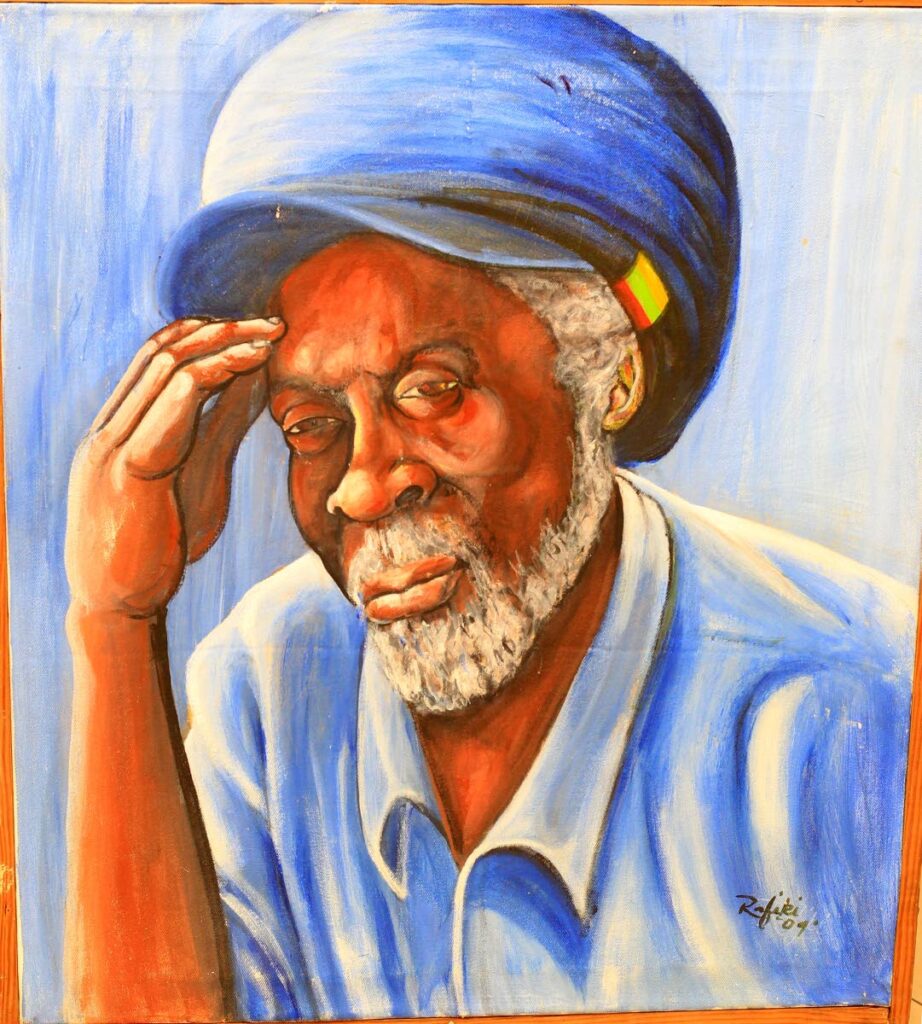Hail Black Stalin, he unified people

Leroy Calliste had the most fitting calypso name, Black Stalin, but he was nothing like the ruthless Russian dictator who terrorised his subjects. Black Stalin used his power to celebrate Caribbean history, culture and music. He strived to build unity in the region. He never demanded respect. He was decades ahead of the Black Lives Matter movement.
Born during World War II on September 24, 1941, Stalin grew up on Coffee Street in San Fernando. His father worked for Texaco oil company, and Stalin counted labour leader Tubal Uriah “Buzz” Butler as one of the first heroes to visit his home. Stalin often visited the Free French panyard with his older brother Dennis. The panyards left indelible images of Caribbean music, history, struggle, brotherhood and social injustice that would surface in his calypsoes, but first, Stalin made a name for himself as a limbo dancer.
When calypso became his calling, Stalin crafted upbeat, uptempo narrative calypsoes with catchy melodies that occupied a fine line between calypso and soca. He tackled prickly subjects like colonialism and Caribbean unity, always in an uplifting way. Stalin earned five national calypso monarch titles and remained a roots man with dreadlocks.
His first calypso crown came in 1979 with Play One, a nostalgic look at calypso and steelband as a history of struggle and Caribbean Man that celebrated his perception of a common West Indian heritage. Stalin never exploited an ethnic divide. Instead, he sang of “one race from the same place… that is the Caribbean man.” He stressed the importance of knowing history and what unites us. Stalin was a champion of women’s rights and addressed women with respect in his calypsoes, which was never the norm for the art form.

Stalin’s calypsoes empowered common people to stand up for what is right. In 1985, he became calypso monarch for the second time with Wait Dorothy Wait, a humorous social commentary about trying to please his fans who requested a smutty calypso from him.
“Four verse and chorus is too much of lyrics to sit down and write in this moment of crisis,” he sang. “My head says yes, but my heart says no. My pleasure comes second to my duty.” Wait Dorothy Wait was a moving statement about duty and sacrifice to make this country better. Stalin’s second offering that year, Ism/Schism, warned that all politics is the same. “You must have a nuclear weapon to hang onto your ism,” he sang.
His third calypso crown in 1987 featured Mr Panmaker which paid homage to pan as a social force and called for Trinidadians to be more protective of its instrument. In Bun Dem, he envisioned himself at the gates of heaven begging for a job to assist St Peter in tossing nefarious characters in the history of slavery and colonialism into the hellfire. This was not revenge, it was sanctioned religious justice in the hands of black people. Thunderous applause in the Queen's Park Savannah, Port of Spain, on the night he dethroned David Rudder caused many people to refer to that performance as causing a near riot.
A more upbeat Stalin became calypso monarch in 1991. He elevated women to a special place in Black Man Feeling to Party, a celebration of marriage, culture and ageing. In an atypical calypso narrative Stalin tells his wife, whom we can all imagine to be his wife in real life, Patsy, to put everything aside and get dressed up to go dancing. They will show all the youngsters how feteing is done. In The Bright Side, he sang, “Our day will come. The bright side is where we’re going.”
His 1995 calypso monarch title was a Tribute to Sundar Popo, a celebration of chutney music encased in a playful picong about the promised song Sundar Popo never delivered to Stalin. In response, Stalin wrote his own chutney. Stalin’s songs always offered a solution to a problem. He described his second song, In Time, “as a message of love and hope.”
Stalin maintained his humility and open-mindedness throughout his career. He knew no racial, religious or ethnic boundaries.
Pannist Andy Narell from the US said, “His message was always clear – Caribbean unity, love, concern for each other – but he didn’t hold back, telling it like it is for decades.”
Daisann McLane, a journalist and singer from New York who performed as Lady Complainer in Shadow’s Master’s Den in 1973 remembers “dashing from Shadow’s Masters Den as I finished my turn onstage and running down Henry Street so see Stalin singing at Kitchener’s Revue. Every night was amazing. He had such incredible body language and timing. It is often said great performers have magical powers, but Stalin really did.”
McLane remembers Stalin “as a really kind man to me and not the least bit patronising. He really knew who he was and was so comfortable and sure of that it allowed him to be generous. I also liked that he was politically sharp and committed, hated injustice but moved through life not with anger but with a great sense of humour and irony,” said McLane.

Weston “Cro Cro” Rawlins, one of calypso’s most controversial performers said, “Stalin was my teacher. When I began singing at Kitchener’s Revue in 1974, he came to me and said they wanted to take me off the programme and bench me. Stalin said, ‘You have to do more.’ He told me to go in front of a mirror and practise.” I listened to him, and I remained on the programme.”
Cro Cro laughs at the time he met Stalin in Fyzabad and shocked him with his song Kidnapping, the first verse of one of his most controversial calypsoes dubbed distasteful and outrageous by most people. .
“Stalin listened to the first verse, got in my face close enough to kiss me and said, ‘Do not sing that song.’ Of course I sang the song. Stalin was a great one – a good teacher; a great philosopher. He is a part of who I am today.”
Many people remembered Stalin as a man with deep roots.
Dennis Ramdeen, who heads Pepper Advertising and Experiential Marketing said, “He sung from the heart and from the ground....He was our mouthpiece narrating our problems and issues in song and at the same time helping us to find a solution.”
When she learned of Stalin’s death, creative director and actor Theodora Ulerie wrote on her Facebook page, “An iroko tree has fallen. When an Iroko tree falls, the thud quakes the land and the news goes abroad; man and animal in anguish mourn their loss for different reasons.”
Barbadian calypsonian Anthony "Gabby" Carter described Stalin as one of the greatest people – not just artistes – that the Caribbean has ever produced.”
No one would beg to differ.
“He was one of the artistes who always kept his ears to the ground and then translated those feelings on stage with a smile and a swagger. He was a warm and kindhearted man who made everyone he encountered feel special,” said David Rudder.
In 1987 government awarded Stalin the Hummingbird Medal (silver). In 1999, he won the Calypso King of the World competition with the calypsoes Ah Feel to Party and Wine Boy, a political satire. The University of the West Indies awarded him an honorary doctorate degree in 2008.
In 2014, Stalin suffered a debilitating stroke after performing in a charity show in south for the St Andrew’s Anglican Church’s building fund. He died at 81 on December 28, 2022.
Leroy Calliste accomplished what no dictator has ever succeeded in doing. He unified people, rooted them in their history and culture and inspired them to be independent individuals. The Black Stalin broke the mental chains of victimhood passed down from history with calypsoes meant to set a people free.

Comments
"Hail Black Stalin, he unified people"